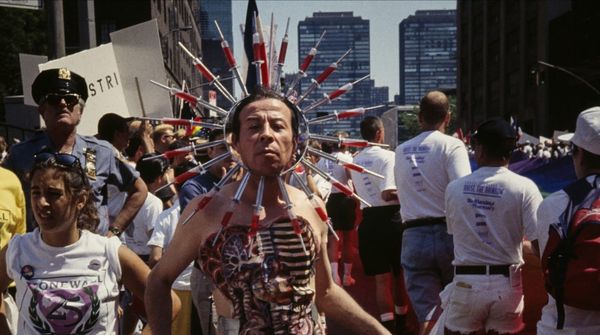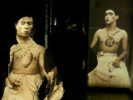Eye For Film >> Movies >> Lemebel (2019) Film Review
Lemebel
Reviewed by: Jane Fae

Lemebel is a documentary based on a true life story. In this case that of Pedro Lemebel, a pioneering figure in Latin America's LGBTQ movement and – I confess, ashamed – a figure I was unaware of until I watched this film.
The narrative is not exactly linear, though here, there, it is possible to trace a line. There are early days, dressing up. Not cross-dressing which, he admits, he had not yet discovered. Just dressing in order to assume other personas...and taking flak on the streets for doing so.

Then there is activism and art: the two weave and interweave and much of the time it is difficult to say where the boundary lies. Or if there was a boundary at all, as listening to Lemebel speak, it is clear he did not draw rigid lines. On the streets. Theatre. Using his body as canvas on which to paint pictures. To make a point. Performance. Poetry. And fire. A lot of fire, used in ways that would no doubt give the average Anglo-Saxon Health & Safety nerd a heart attack.
This is a jumble: a life pulled from out that cardboard box that sits under your stairs. You know the one: it is full of old photos and films and more recently video footage, drawn hither and thither from your life, from your friends' lives. Grainy. Disjointed. Not shot for any purpose but, if you are lucky, when pieced together, forming some sort of whole.
As here. “You told me to film you and keep filming” asserts writer/director Joanna Reposi at start and end. And this she does, bringing together the bits and pieces from out the box, assembling them into a sort of whole and then filling in the gaps with gentle unobtrusive questions. Not interrogation; no, nothing so vulgar.
Enough. Just enough to draw out themes from a life. Like the importance of words, starting with Lemebel's name, which he chose for himself. Because Spanish surnames are masculine. So he chose Lemebel, a name invented by his grandmother when running away.
Yes: words matter. That is why he dislikes 'gay' which he sees as having little in common with the working class homosexual: the guy who grows up in poverty, who faces persecution and murder on the street. Unlike the posh gay in a bow tie, who may lose his job if outed, but not his life.
Words and language matter. A whore can say whore. A fag can talk of fags. But in the mouth of of a smart-suited presenter, homosexual becomes homophobic. So he is keen to reclaim words, as his catalogue of words for queer, listed out in one of his poems, makes clear.
Lemebel's vision is revolutionary. Starting out as a love-inspired hippy, he understood early the need to fight back. There is little overt political action in this film: no street demonstrations; and with one brief exception, the army, which played such a major part in Chile during the period of Lemebel's life, is invisible.
But early on, he founded homosexual collective “Mares of the Apocalypse” because of AIDS, because of oppression on the streets. Because when Lemebel first began his work, under the dictatorship, gay people were murdered openly on the streets.
Here he is campaigning at Stonewall in the United States, demanding they take back AIDS which he sees as capitalist imposition on his country. Here he is, over and over, using his body to make a point: the eternal outsider because despite his growing radicalisation, neither communists nor socialists had much time for homosexuality.
And betwixt and between there are conversations, between Lemebel and Reposi, interspersing the high politics with the personal. How he misses his mother. The impact of giving up smoking.
There is a nervous energy to Lemebel, even at rest. He cannot speak, he claims, without music in the background. So we return, more than once, to the sentimental ballad from Spanish singer Jeanette, Corazón De Poeta ('Heart Of A Poet').
This is not conventional narrative, start to end, born in, schooled at, died documentary. Still, there is a timeline of sorts, from footage of Lemebel's early days through to his last performances when he is clearly ill. All bookended by images shot scarcely two weeks before his death from cancer of the larynx in January 2015.
An interesting insight that leaves me wanting to know more.
Reviewed on: 06 Oct 2019
















